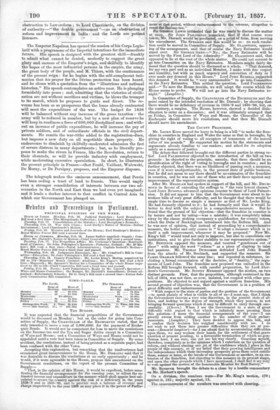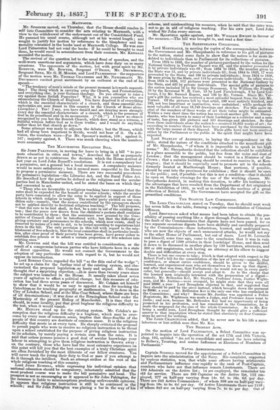Tan Cowry Fitexclasn.
Mr. Loans Rine moved for leave to bring in a bill "to make the franchise in counties in England and Wales the same as that in boroughs, by giving the right of voting to all occupiers of tenements of the annual value of ten pounds." He supported his motion by the. statements and arguments already familiar to our readers; and asked for its adoption solely as a measure of justice.
The debate that followed brought out the different parties in strong re
• lief. Lord PALMERSTON objected to the introduction of the bill on two grounds; he objected to the principle, namely, that there should be an identification of the right of voting in boroughs and in counties ; and he further objected, that there was no likelihood of passing such a measure, even if it were unobjectionable, in the present state of public business. But he did not mean to say there should be no extension of the franchise in counties, and he was not one of those who set their faces against any improvement of the representative system. After Mr. HEADLAM had spoken in support of the bill, and Mr. DRUM. MOND in favour of extending the suffrage to "the very lowest classes," Lord JeanRussram advanced opinions counter to those of Lord Palmerston. It did not appear to him that the Government were about to introduce bills of very great difficulty, and he thought that there would be ample time to discuss so simple a measure as that of Mr. Locke King. He had formerly objected to it ; he had formerly said that it would be better to deal with the subject in a comprehensive measure. But he found that the ground of his objection-that the franchise in counties is by tenure and not by rating-was a mistake ; it was completely taken away by the clause making occupancy a cpialification for county voters, which the Duke of Buckingham introduced into the Reform Bill. Anti he was now of opinion, that instead of proceeding by a comprehensive measure, the better and only course is "to adopt a measure which is in itself a safe improvement, whenever it may be proposed." Now Mr. King's bill "would tend not only to improve, but also to consolidate our institutions, and to give further stability to our representative system." Mr. BENTINCK opposed the measure, and taunted "gentlemen out of place" with using the word " reform " as a piece of claptrap to raise bad passions. Mr. THomAS DuNComBE defended Lord John Russell from the attacks of Mr. Bentinck, and supported the measure. Sir JAMES GRAHAM followed the same line ; and repeated in substance, including a formal renunciation of the doctrine, of "finality," the arguments of Lord John. The franchise now proposed was embodied in the Reform Bill brought forward, with careful preparation by Lord Aberdeen's Government. Mr. SIDNEY HERBERT opposed the motion, on two distinct grounds. First, that the proposition, although contained in the bill of 1854, was not then, as now, isolated, but coupled with other propositions. He objected to and argued against a uniform franchise. His second ground of objection was that the Government is in a position of great difficulty and embarrassment.
"With respect to the state of parties and the position of the Government -to speak plainly of what is visible to all of us-I must say, that I think the Government exercise a very wise discretion, in the present state of af
fairs, and looking to the degree of strength which they possess, in not bringing forward questions which it may be difficult to carry through successfully. ((heers.) When I see the Government in a state of great difficulty with regard to that which is infinitely more pressing, than this question-I mean the financial arrangements of the year-I am greatly averse from adding another to the number of their embarrassments. (Laughier„) They have decided to oppose this hill, and I confess their decision has weighed considerably with me. I do not wish to put them into greater difficulties than they are at present-(Renewed laughter)-for I am afraid that by accumulating difficulties upon them, we may weaken their hands for the settlement of that grave question at present pending, to a favourable termination of which no gentleman here, I am sure, can yet see his way clearly. Guarding myself, therefore, completely as to the opinions which I entertain on the question of reform, and without abating one jot of the confidence which I place in the people of this country, or of my belief that their growing intelligenee and the Independence which their increasing prosperity gives them must entitle them, sooner or later at the hands of one Government or another, to an ex,tension of the franchise, but objecting to this measure in its present shape, and upon the other grounds which I have mentioned, I shall feel it my duty to vote against the motion of the honourable Member for East Surrey."
Mr. ROEBUCK brought the debate to a close by a hostile commentary on Mr. Herbert's speech.
On a division, the numbers were—For Mr. King's motion, 179; against it, 192; majority against, 13.
The announcement of the numbers was received with cheering.
Mr. Seamena moved, on Thursday, that the House should resolve itself into Committee to consider the acts relating to Maynooth, with a view to the withdrawal of the endowment out of the Consolidated Fund. He pursued his usual course, although not at his wonted length ; and sought to justify his motion by references to the blasphemy and immorality contained in the books used at Maynooth College. He was sure Lord Palmerston had not read the books : if he could be brought to read them, he would recoil in astonishment from their contents. Mr. KENDALL seconded the motion.
The revival of the question led to the usual flood of speeches, and the well-worn assertions and arguments, which have done duty on so many occasions. The opponents of the motion, led with great spirit by Mr.
Rosamex, were Mr. Bow yea, Sergeant O'Barsw, Mr. Ilitummorm, Sergeant SHEE, Mr. G. H. Moons, and Lord PALMERS'rON : the supporters of the motion were Mr. THOMAS OHATABEWS and Mr. NEwnsoars. Mr. DRUMMOND excited great merriment by an outburst at the end of his speech— The tendency of men's minds at the present moment is towards superstition? The thing which is carrying away the Church, and Protestantism, and everything else, is your German theology. Do you attempt to raise a cry against those foolish Puseyites ? Why, it is you yourselves who are emasculating the Church of England. You have deprived it of everything which is the essential characteristic of a church, and those essential characteristics are now found in this country in the Church of Rome alone.
• (Laughter.) Yes ! I say, you have denied and are denying more strongly every day the essential characteristic of a church, which is the presence of God in its priesthood and in its sacraments. (" Oh ! ") I know no church recognized by you but the Romish Church, which does stand as a witness a faithful witness before God as to these truths; and I would do anyth.eng rather than let that church go down." Some attempt was made to adjourn the debate ; but the House, which had all along been impatient to divide, would not hear of it. On a division, the numbers were—For Mr. Spooner's motion, 159; against it, 167; majority against, 8, There was much cheering when the numbers
were announced.



























 Previous page
Previous page